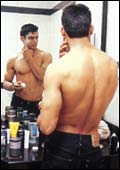 |
| Sara Lee: Betting on Brylcreem |
Till
not so long ago, men's cosmetics was more an oxymoron and less of
a market. No longer. Industry estimates indicate that the pie for
men's toiletries has burgeoned to Rs 250 crore, and is growing at
12-16 per cent (across various segments) annually. One company that's
attempting to cash in on this growth is Sara Lee TTK (known more
as the Brylcreem company), a 100 per cent subsidiary of Sara Lee
since January 2002.
Recently, the company launched a shave gel,
two deodorant variants, one deo talc and two after-shave variants,
all under the umbrella Brylcreem brand. By 2004, CEO V.S. Pradeep
Kumar hopes to carve up a 15 per cent share in shaving preparations,
and 20 per cent in men's deodorants and talcum powder.
So far, Sara Lee's success in India is confined
to Brylcreem, which contributes 40 per cent of the company's sales
of Rs 65 crore, and which leads this segment with a 63 per cent
share. The hope is that the image, reputation and success of Brylcreem
will rub off on the new launches. There's Gillette, which controls
three-fourths of the shaving gels segment, Denim which has half
of the after-shaves market in the bag, and deodorants is dominated
by HLL's Rexona and Axe brands. For Sara Lee TTK, the battle has
just begun.
-Nitya Varadarajan
THOMAS
COOK
Thank God For Forex
Thomas Cook makes hay in a period that's proved
crippling for the travel and leisure business by wringing the foreign
exchange division.
Thomas
Cook India has just done what no other tour operator could do before.
It's braved the most rattling slump in the travel trade and emerged
unscathed with a bottomline growth of 135 per cent (to Rs 11.2 crore)
for the half year ended April 30, 2002 (the company had closed the
previous year in October). Naturally, Ashwini Kakkar, Managing Director,
Thomas Cook India, is pleased as punch, rattling out PBT and pat
figures to prove his point.
But just how did he do it? By implementing
sap, he managed to raise operational efficiencies and bring down
costs. Transaction costs have apparently come down by a fifth to
Rs 100 per transaction.
But even such cost savings aren't radical enough
to boost profits, not post-September 11, when the travel and leisure
business virtually went to sleep. V. Dandapani, CEO, Carlson Wagonlit
India, a former Thomas Cook hand, points out that the leisure and
travel business had little to do with Thomas Cook's impressive report
card. "The main factor for growth is nothing else but forex.
About 70 per cent of TCIL's profit comes from forex, around 20 per
cent comes from corporate travel and the rest from leisure,"
says Dandapani.
To hedge itself against future downturns in
its mainline businesses, Thomas Cook is now planning forays into
non-life insurance, emergency services, call centres, and card products.
The company is also planning to expand into the Maldives and Bangladesh.
That should make Thomas Cook a more broad-based player. For now,
though, it's foreign exchange, that's carrying the day.
-Moinak Mitra
ARCHIES/EXPRESSIONS
Is An Acquisition On The
Cards?
ITC's Expressions could acquire Archies
although both deny it.
 |
| Anil Moolchandani: Archies is the #1
card company in India |
So
much for synergy. despite its considerable distribution muscle (2.5
million outlets) and historical presence in paper manufacturing,
ITC has little to show for its two-year-old foray into the Rs 300
crore greeting card business in the country. In number terms, the
Rs 8,816 crore cigarette major ITC's Gold Flake Expressions card
division has under a 10 per cent marketshare; the market is dominated
by the Rs 80.5 crore Archies Greetings & Gifts with a 45 per
cent share. It doesn't help ITC that it has set an ambitious target
of Rs 250-crore for the division by 2005.
Acquisitions may help. ITC vehemently denied
any such move on its part and Archies' Chairman and Managing Director
Anil Moolchandani brushed aside any possibility of selling out to
ITC with a brusque, ''There have been no talks.'' The market, however,
is agog with speculation that the two (ITC and Archies) have discussed
the possibility of ITC taking a stake in Archies. The stockmarket
seem to have factored this in; Archies' share price is bound northwards,
and at Rs 140.90 (BSE July 2, 2002) has appreciated nearly 200 percent
since early January. This, when the company posted a 17.6 percent
drop in profits after tax in 2001-2002. Surely, something's brewing.
-Shailesh Dobhal
REPORTER'S
DIARY
Burnished Honour
A Punjab village discovers that being the world's
source of badges and heraldic emblems doesn't necessarily translate
into affluence.
 |
| Autumn of the patriarch: Md. Hanif Shah
is considered the man who started it all in Malerkotla |
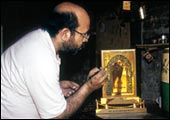 |
| Old gold: Irfan Anjum rendering final
touches to a trophy ordered by the Saudi Arabian government |
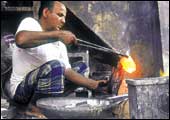 |
| Smelting pot: A trophy-smith at work
(top) and trader Md. Altaf Rawat sits over his laurels (bottom) |
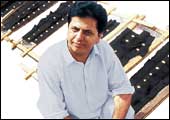 |
Irfan
Anjum has a burning desire to go online, to be defined in the universal
language of the URL (unique resource locator), to have his own piece
of real estate on the www. At 42, the dimunitive proprietor of Anjum
Badge House realises that the web is the easiest way to bypass fat-cat
exporters who make five rupees for every one they part with.
Anjum is a Malerkotla badge-maker. Fashioning
coats of arms, badges, and trophies is his trade. As for Malerkotla,
the Punjab village is, arguably, the badge and trophy-making capital
of the world. It lies 45 kilometres south of Ludhiana, off a rarely-busy
stretch of the Ludhiana-Patiala highway, but the badges and trophies
created by some 3,000 artisans who've made it their home find markets
all over the world.
Colleges attached to Oxford and Cambridge U
are customers, as are some Ivy League colleges in the US, the US
Marines (semper fi and all that), and educational institutions and
the armed forces of several countries in West Asia, Europe, Africa,
and South East Asia. And when global fashion labels need some metal
work, it is Malerkotla's artisans who cater to the demand; Ralph
Lauren and Buffalo jeans are names that are fairly well known in
this Punjab village.
For all that, most badge-makers are close to
penury. It is export houses in Meerut and Delhi that make the money.
"My badge will fetch me Rs 20 in India; but it sells for Rs
100 in the US," rues Anjum. After paying for labour and material,
manufacturers like Anjum rarely make profits higher than 5 per cent.
Only two badge-makers in all Malerkotla have
export licences. Mohammad Shafiq Rana is one; assisted by his three
sons he interacts directly with customers and boasts the wherewithal
to cater to big-size tenders. His turnover? A mere Rs 700,000.
Size and scale aren't the only barriers to
affluence; education is too. Less than 10 per cent of Malerkotla's
badge traders have studied beyond high school. Their inability to
communicate directly with customers makes it easy for the middlemen
to strike deals beneficial to themselves. Anjum thinks he can break
out of their shackles. "I hold a diploma as a civil draughtsman
and am the only post-graduate in the trade."
 |
| Relay: Shafiq Rana supervises 19-year-old
son Suhail |
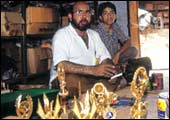 |
| Sharing Honours: Irfan Anjum striking
a pose with co-workers |
 |
| All in family: Womenfolk of the Shafiq
Rana household weave magic with their nimble fingers |
A confederation or association would help. Only,
the sliver-like profits make that well-nigh impossible: rival badge-makers
undercut each other regularly. If there's a bright spot, it is the
fact that orders are pouring in, some at the expense of the one
country that could compete with India, Pakistan. Shafiq Rana's son
Tahir claims this is because Malerkotla Inc's quality standards
are better and clicks on an e-mail from a Canadian customer complaining
about the quality of badge-making in Pakistan to prove his point.
The family-system works. Given the low profit
margins, the Rawat model seems a logical one. Mohammade Altaf Rawat,
the other Malerkotla trader with an export licence, employs, "the
entire family, some 50-60 relatives, make badges (for me)."
The Indian army is a large customer. Ifthikar
Hanif Metal Craft, founded by octagenarian Mohammad Hanif Shah,
widely considered the man who started it al Malerkotla, supplies
exclusively to the army and to police departments across the country.
Exports, though, is a better option, and Hanif's son Ifthikar-that's
right, the company is named after him-claims the deployment of the
armed forces on the border with Pakistan hasn't helped business.
Bypassing exporters may. Like Anjum, Rawat
is in quest of a URL. Far from the swank new-age offices in which
the term was first heard, in dustry Malerkotla, disintermediation
works its magic.
-Moinak Mitra
|

